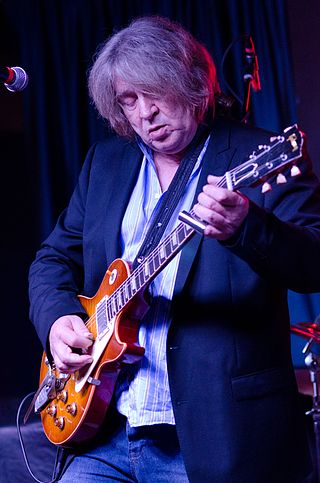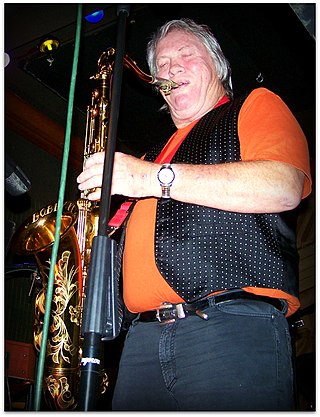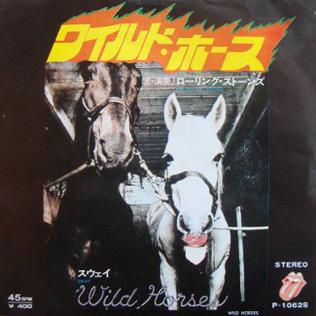
Michael Kevin Taylor is an English guitarist, best known as a former member of John Mayall's Bluesbreakers (1967–1969) and the Rolling Stones (1969–1974). As a member of the Stones, he appeared on Let It Bleed (1969), Get Yer Ya-Ya's Out! The Rolling Stones in Concert (1970), Sticky Fingers (1971), Exile on Main St. (1972), Goats Head Soup (1973) and It's Only Rock 'n Roll (1974).

Let It Bleed is a studio album by the English rock band the Rolling Stones, released on 28 November 1969 by London Records in the United States and on 5 December 1969 by Decca Records in the United Kingdom. Released during the band's 1969 American Tour, it is the follow-up to Beggars Banquet (1968), and like that album is a return to the group's more blues-oriented approach that was prominent in the pre-Aftermath (1966) period of their career. Additional sounds on the album draw influence from gospel, country blues and country rock.

Sticky Fingers is a studio album by the English rock band the Rolling Stones. It was released on 23 April 1971 on the Rolling Stones' new label, Rolling Stones Records. The Rolling Stones had been contracted by Decca Records and London Records in the UK and the US since 1963. On this album, Mick Taylor made his second full-length appearance on a Rolling Stones album. It was the first studio album without Brian Jones, who died two years earlier. The original cover artwork, conceived by Andy Warhol and photographed and designed by members of his art collective, the Factory, showed a picture of a man in tight jeans, and had a working zip that opened to reveal underwear fabric. The cover was expensive to produce and damaged the vinyl record, so the size of the zipper adjustment was made by John Kosh at ABKCO records. Later re-issues featured just the outer photograph of the jeans.

"Brown Sugar" is a song recorded by the English rock band the Rolling Stones. Written primarily by Mick Jagger, it is the opening track and lead single from their album Sticky Fingers (1971). It became a number one hit in both the United States and Canada. In the United Kingdom and Ireland, it charted at number two. In the United States, Billboard ranked it as the number 16 song for 1971.

"You Can't Always Get What You Want" is a song by the English rock band the Rolling Stones from their 1969 album Let It Bleed. Written by Mick Jagger and Keith Richards, it was named as the 100th greatest song of all time by Rolling Stone magazine in its 2004 list of the "500 Greatest Songs of All Time" before dropping a place the following year.

Metamorphosis is the third compilation album of the Rolling Stones music released by former manager Allen Klein's ABKCO Records after the band's departure from Decca and Klein. Released in 1975, Metamorphosis centres on outtakes and alternate versions of well-known songs recorded from 1964 to 1970.

Robert Henry Keys was an American saxophonist who performed as a member of several horn sections of the 1970s. He appears on albums by the Rolling Stones, Lynyrd Skynyrd, Harry Nilsson, Delaney & Bonnie and Friends, George Harrison, John Lennon, Ringo Starr, Eric Clapton, Joe Cocker and other prominent musicians. Keys played on hundreds of recordings, and was a touring musician from 1956 until his death in 2014.

"Wild Horses" is a song by the English rock band the Rolling Stones. It was first released in 1970 by the Flying Burrito Brothers as the Stones didn't think the demo was worth recording fully. It was subsequently recorded by the Stones for their 1971 album Sticky Fingers when they felt it was worth reconsideration. It was also released on 12 June 1971 as a single, with "Sway" as its B-side.
"Ventilator Blues" is a song by the English rock band the Rolling Stones that is included on their 1972 album Exile on Main St.
"Dead Flowers" is a song recorded by the Rolling Stones. Written by Mick Jagger and Keith Richards, it appears on their 1971 album Sticky Fingers as the fourth track of side two.
"Sway" is a song by the English rock band the Rolling Stones from their 1971 album Sticky Fingers. It was also released as the b-side of the "Wild Horses" single in June 1971. This single was released in the US only. Initial pressings of the single contain an alternate take; later pressings include the album version instead.
"Midnight Rambler" is a song by English rock band The Rolling Stones, released on their 1969 album Let It Bleed. The song is a loose biography of Albert DeSalvo, who confessed to being the Boston Strangler.
"Factory Girl" is a song by the Rolling Stones which appears on their 1968 album Beggars Banquet.
"I Got the Blues" is a song recorded by the Rolling Stones. Written by Mick Jagger and Keith Richards, it appears on their 1971 album Sticky Fingers. It is a slow-paced, bluesy song featuring languid guitars with heavy blues and soul influences.
"Goin' Home" is a song recorded by the English rock band the Rolling Stones. Written by Mick Jagger and Keith Richards, it was the longest popular music song at the time, coming in at 11 minutes and 35 seconds, and was the first extended rock improvisation released by a major recording act. It was included as the sixth track on side one of the United Kingdom version and the fifth track on side two of the American version of the band's 1966 studio album Aftermath.
"Live with Me" is a song by the Rolling Stones from their album Let It Bleed, released in December 1969. It was the first song recorded with the band's new guitarist Mick Taylor, who joined the band in June 1969, although the first record the band released with Taylor was the single version of Honky Tonk Women. Taylor later described the recording of "Live with Me" as "kind of the start of that particular era for the Stones, where Keith and I traded licks."

"Bitch" is a song recorded by the English rock band the Rolling Stones. Written by Mick Jagger and Keith Richards, "Bitch" is a "hard-bitten rocker" featuring Jagger on vocals and a powerful horn line. It was released as the B-side to the advance single, "Brown Sugar", from their ninth British and eleventh American studio album, Sticky Fingers. It was originally released one week before the album. Despite not being used as an official single by itself, the tune has garnered major airplay from AOR radio stations. The song was recorded in October 1970 at London's Olympic Studios, and at Stargroves using the Rolling Stones Mobile studio.

The Rolling Stones' 1970 European Tour was a concert tour of Continental Europe that took place during the late summer and early autumn 1970.

The Rolling Stones' 1971 UK Tour was a brief concert tour of England and Scotland that took place over three weeks in March 1971.

Zip Code was a concert tour by English rock band the Rolling Stones. It began on 24 May 2015 in San Diego and travelled across North America before concluding on 15 July 2015 in Quebec City. The tour was announced on 31 March 2015 with tickets going on sale to the general public two weeks later. The name is a reference to the jeans-related artwork for Sticky Fingers, which received a special re-release in 2015, and had its entire track list played during the Zip Code Tour.










